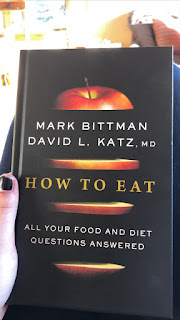How To Eat Review

How to Eat by Mark Bittman and Dr. David Katz
Overall: 5
As you have all probably noticed, I've gotten really into learning about nutrition, food science, and food policy lately. I've been reading a ton of books surrounding the topic lately, and it's been very eye opening. Even as they all boil down to the same essential advice (because the science is the science regardless of who wants to make a buck off of it), the different approaches to displaying the findings and advice on how to incorporate it into your life fascinates me.
Anyway, I picked this one up on a whim after a co-worker mentioned it to me. I was currently reading Food Fix on audiobooks, so I wasn't particularly looking for a food book, but as I was thumbing through, I got sucked in. This is by far the shortest comprehensive nutrition book I've come across. It's also uniquely formatted. The entire book is written as a Q&A which I personally love. It made me excited to keep reading in a way that long chapters really don't. It works particularly well for this kind of subject that easily can be overwhelming or boring at times. And, if you don't want the whole picture, it makes it easy to jump to specific points or common points of interest without feeling lost. I devoured the book in about a day.
Honestly, of all the books on nutrition I've read so far, I would most highly recommend this for everyone to read. It offers the best, concise (at just over 200 pages) glimpse at what you can do to improve your health and what to believe in all the confusing articles you find on the internet. They have a great approach that focuses on dispelling the hysteria the food media can create and get as transparent with people as possible. Also, in making recommendations, they're also the most approachable. There's no guilt if you're not ready to give up meat or dairy. Sure, like all of these books, the findings are that a plant based, generally vegan diet is optimal, but all of the advice in the book rests on a sliding scale that makes you question "What is this replacing?" It offers a great way to ease into healthier eating and prioritize your approach to doing that without the element of fear that's heavily employed in some of the other books out there.
I enjoyed their no nonsense, blunt approach to interpreting the science and the light tone they use. There's a lot of humor and sarcasm that keeps each section engaging and quite a bit of fun banter between the phrasing of the questions and the answers. I think that's the definite advantage of having it co-authored by an acclaimed food writer and a doctor. They are also very focused on the cumulative picture of all of the food you eat and the total impact. This book manages to blend a lot of the subtopics of other books in the food space into this easy primer. There's a lot of interesting anthropological evidence used to tie into common sense food research and eating patterns, lots of studies, advice on reducing chronic disease, some pointers for healthfully losing weight, and a focus on the environmental impact of what we eat and, to a certain degree, food policy. I like that these elements are constantly interwoven in deciding what the best choices are because we cannot reasonably divorce things like environmental impact and ethics from our health. Everything is a web. Some books seem to forget this in an attempt at answering a very narrow question. It doesn't go into it a ton, but it's certainly enough to create far more awareness and possibly inspire someone to look into it more.
I also want to applaud the focus on clarity and helping people create a better understanding of food media and how those clickbait, oftentimes scary, headlines work. It seems like the book was written to help people wade through the confusion of fads and ever changin recommendations. Helpful information and myth busting happens on every page, but the entire back section is dedicated to decoding those kinds of articles and the science that are used to support them. They discuss what a double blind control trial (maybe the most common phrase in nutrition books) actually is and what it doesn't mean. They point out that a lot of the most dubious headlines are built on single studies usually stripped on context. They give advice on how to pick out the useful bits of information. I think this is so important in a world on constantly moving news and a lack of real, verifiable information behind a shocking headline. It's nice to see when so many of these books want you to follow in blind faith.
Overall, I'd recommend this book to everyone, especially people who want to learn more about what they're eating but are confused about where to start. There are books that go into ton more detail but are also much more time intensive and possibly confusing (How Not to Die). It offered satisfying amounts of information and enough new interpretation that made sense that it made it worth the read even though I already knew the principles they were looking to drive home. I get excited about any book that might lead to a new group of people finding the positive impact of interrogating what we eat and why we eat it.
Others Like This...
Links of Interest:



Comments
Post a Comment